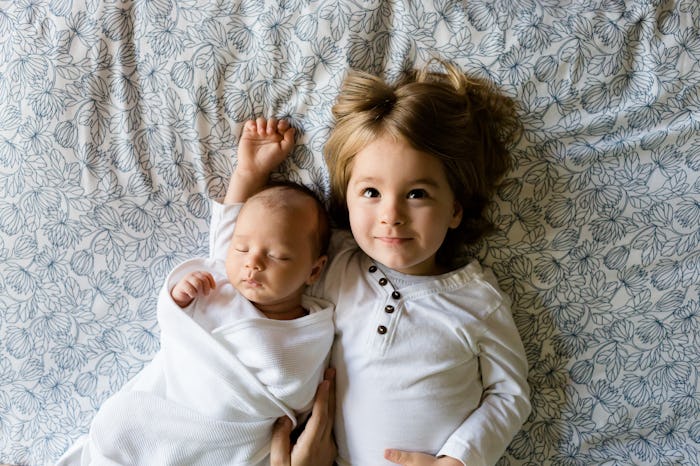Life
Does Birth Order Profoundly Affect Your Kids' Mental Health? The Findings Are Mixed
Every kid with siblings will claim that birth order affected them in some way or another: older children complain about being subjected to stricter rules, while younger siblings say their older counterparts hog the limelight. Older children may try to sway parents into giving them a larger portion of dessert, because they're "bigger." (Mind you, I may just be projecting my own sibling hang-ups here.) Petty squabbles aside, however, can birth order profoundly affect your kid's mental health? According to a handful of studies, whether your kid is the oldest, youngest, or smack in the middle can indeed affect a few aspects of their mental health.
One important thing to note, however, is that many of the studies regarding birth order suffer from one major flaw: they don't take family size into account. And, as Joshua Hartshorne, an assistant professor at Boston College's psychology department, explained in Scientific American,
There are many reasons that family size could affect our predilections and personalities. More children mean that parental resources (money, time and attention) have to be spread more thinly. Perhaps more telling, family size is associated with many important social factors, such as ethnicity, education and wealth. For example, wealthier, better-educated parents typically have fewer children. If astronauts are more likely to have well-educated, comfortable parents, then they are also more likely to come from a smaller family and thus are more likely to be a firstborn.
So, while birth order studies should be taken with a grain of salt, there are a few ways birth order can affect children. The most extreme example? According to several birth order studies, younger siblings are more likely to commit suicide than older ones. According to Live Science, studies in both Norway and Sweden found that the later a person's birth order, the higher their risk of suicide was. Younger siblings also tend to die from accidents more often than their older counterparts, so it could be that younger siblings are more impulsive — which would help explain their higher risk of suicide.
Sociologist Mikael Rostila, who looked into the link between birth order and suicide in Sweden, told Live Science:
Our findings are important, since they highlight that birth order should be considered an early-life circumstance that determines mental health across the life course.
Although less related to mental health, younger siblings are also more prone to addiction, according to Medical Daily, and take up smoking and drinking more frequently than older siblings. Firstborns tend to self-report better mental (and physical) health, according to Psychology Today, and usually report being happier. Middle children tend to carve out their niche by being more prosocial, and they tend to score higher than their younger and older counterparts on both extraversion and agreeableness.
When it comes down to it, however, there are many confounding factors that come into play in birth order studies — and some research suggests that a child's perceived role in their family influences their personality and mental health more than their actual birthdate in relation to their siblings. Parents' beliefs about birth order also tend to play a role in children's developments, making parents' birth order stereotypes turn into self-fulfilling prophecies for their children.
"The moral of the story for parents," according to psychology professor and Psychology Today contributor Susan Whitbourne, "is to look for your own biases and stereotypes about birth order as you think about what your children are capable of doing. Encourage them to teach each other, to define their own identities in the family, and to avoid labeling themselves based on their birth order. Don’t let the lives of your children be dominated by the random forces that caused them to be born when they were."
In other words, try to clear your head of any stereotypes you've heard about or read up on online, and let your kids define themselves.
